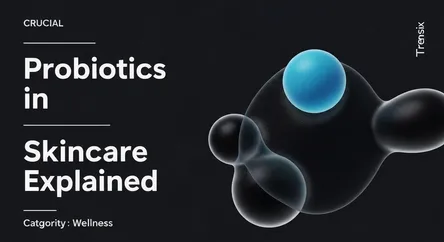Wellness
Probiotics in Skincare Explained

Discover how probiotic skincare works by balancing your skin's microbiome to improve hydration, reduce inflammation, and strengthen its natural barrier.
What is it?
Probiotic skincare involves the topical application of live, beneficial microorganisms, or "good bacteria," to the skin's surface. Just like the gut, your skin has its own unique ecosystem of microbes called the skin microbiome. Probiotic-infused products like creams, serums, and cleansers are designed to support and restore balance to this microbiome. By reinforcing this natural ecosystem, these products help strengthen the skin's protective barrier, which is the first line of defense against environmental threats, irritation, and harmful bacteria.
Why is it trending?
The rise of probiotic skincare stems from a growing consumer awareness of the skin microbiome's crucial role in overall skin health. This trend parallels the established popularity of oral probiotics for gut health, extending the focus from internal wellness to external skin vitality. Consumers are increasingly seeking science-backed, functional ingredients that offer tangible benefits. As "clean beauty" and wellness continue to dominate, the appeal of "microbiome-balancing" and "barrier-repairing" claims has surged, making probiotics a key ingredient for those looking for gentle yet effective solutions.
How does it affect people?
Using probiotic skincare can lead to a healthier, more resilient complexion. These beneficial bacteria help calm inflammation, making them effective for managing conditions like acne, rosacea, and eczema. By strengthening the skin's barrier function, probiotics enhance its ability to retain moisture and protect against environmental aggressors like pollution. This can result in improved hydration, reduced redness and sensitivity, and a more balanced skin tone. Some studies also indicate that probiotics may help reduce signs of aging by mitigating damage from UV light.